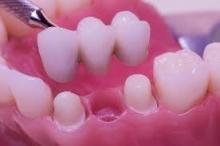Our researchers have developed a novel method that uses proprietary composition of stabilized multifunctional nanoparticles in combination with photodynamic activation to obtain durable and more effective endodontic treatments (root canal therapy). The use of a natural biopolymer allows a better integration into the dentin host tissue, and the production of anti-microbial activity similar to natural dentin. The biopolymer nanoparticles conjugated with photosensitizers have the dual effect of increasing anti-biofilm efficacy and minimizing toxicity compared with standard root canal filling materials. The combination of engineered nanoparticles and photo-activation will destroy remnant microbes and promote a natural mineralization of treated teeth, thus reinforcing the hard tissue dentin while limiting bacterial entrance.
OPPORTUNITY
Root canal or endodontic therapies involve the physical removal of the tooth root pulp, leaving a hollowed-out root canal or opening which is bordered by exposed dentin. Since infection and subsequent removal of the highly hydrated vascularized dental pulp tends to weaken the remaining dentin structure, teeth that undergo endodontic therapies are more prone to fracture and root failure. During endodontic treatments, infected tissues within the root dentin are typically managed using antimicrobial agents so as to eliminate causative microbes. Conventional treatment approaches frequently result in the incomplete elimination of microbes that reside within the root dentin. Furthermore, conventional antimicrobial agents may result in treatment induced changes in the mechanical characteristics of the dentin tissue surrounding the hollowed out root canal, as well as degradation of the infected dentin tissues due to host and/or bacterial derived proteases. This degradation of the hard dentin tissues may further result in a significant decrease of mechanical tooth strength. While various alternative antimicrobial approaches to achieve effective root dentin disinfection have been proposed over the years, conventional root therapies have not addressed the improvement of mechanical properties of infected hard tissues.
COMPETITIVE ADVANTAGE
- Enhanced antibacterial & anti-biofilm efficacy
- Improved structural stability/mechanical reinforcement of dentin collagen
- Single-step root canal disinfection procedure before root canal filling and sealing
- Remineralization of hard or connective tissues
IP STATUS: Patent application under prosecution





